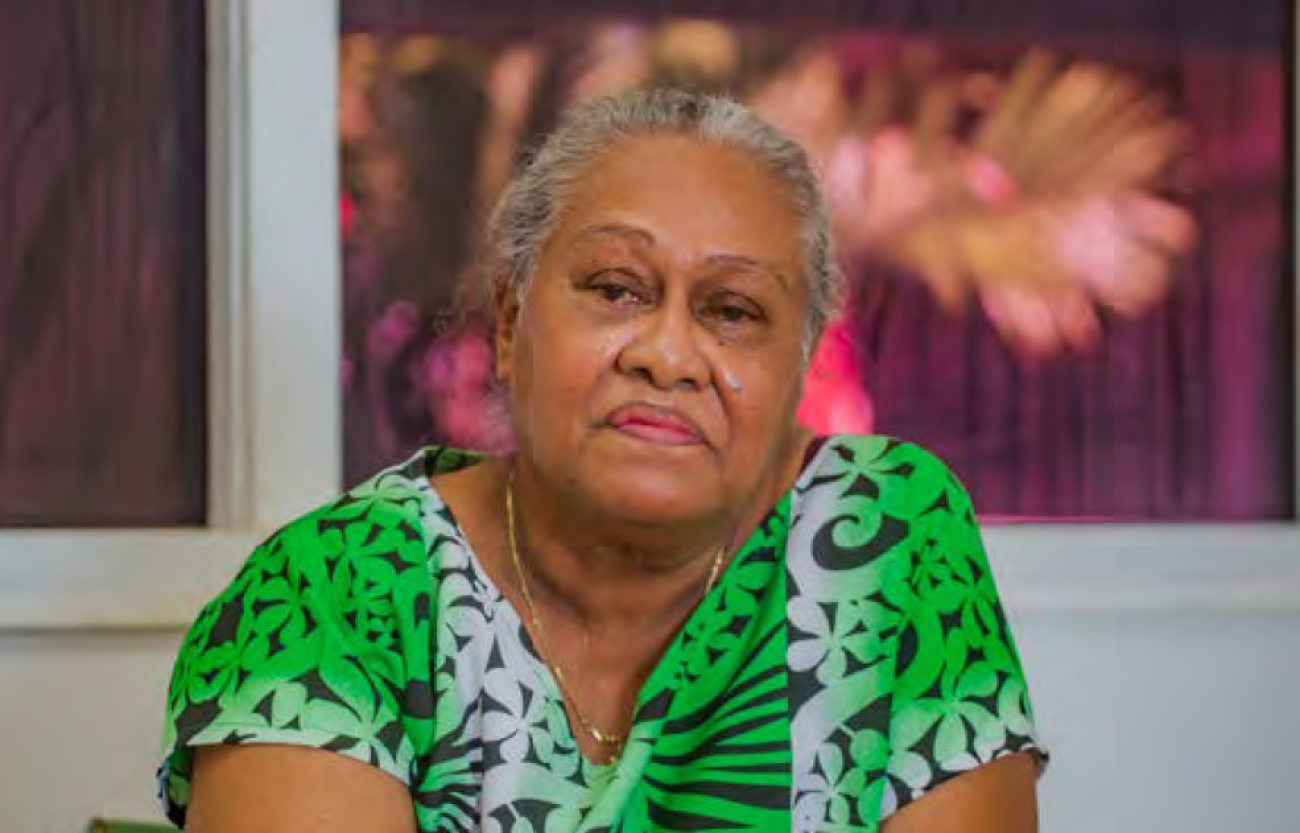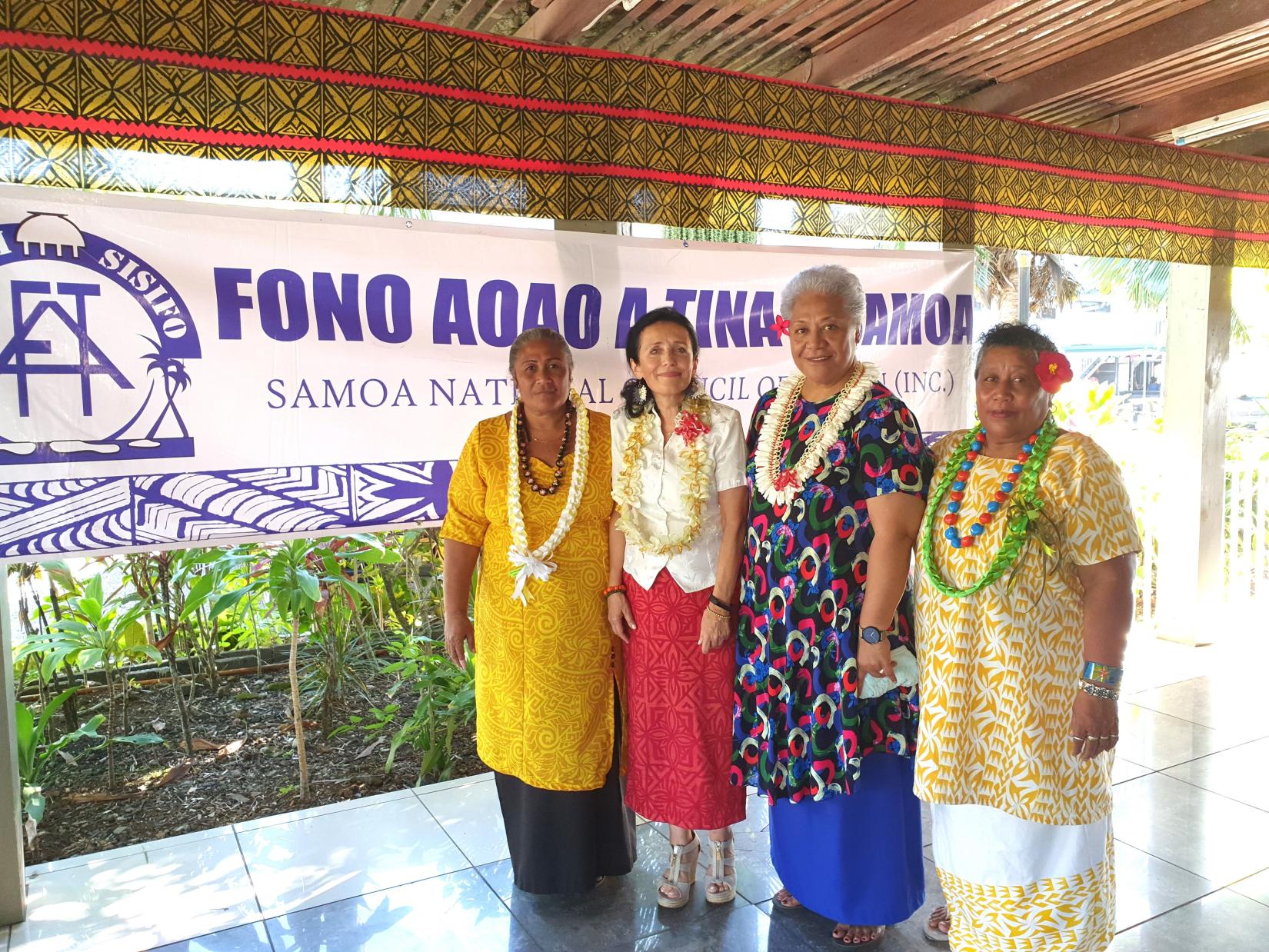Pam, driving the vehicle of change for community women movements.

The perseverance of the SNCW bore fruit with the President of the SNCW becoming the first woman Prime Minister for this country.
Fuatino Pam Sua or affectionately known as ‘Pam’ first became involved in the business of the Samoa National Council Women (SNCW), simply by being the driver for its founding President, Masiofo Fetauimalemau Mataafa.
In 1972, I was sent home after schooling in New Zealand. While in NZ, I taught myself how to drive.
Thankfully, it was my driving skills that the late Masiofo Fetauimalemau, called me to drive her around and do the bidding of the old ladies of the SNCW, taking them to meetings and so forth.
I enjoyed the driving because I also got to sit in, listen and understand the governance and operations of the Council. Most important was the relationships with the old ladies and the knowledge and wisdom shared amongst them that I even learnt so much from it.
Some years later, Pam was assigned the role of managing the SNCW finances.
Fast forward to 2012, just before Samoa’s celebration of its independence, Pam was organizing lunch and making transportation arrangements for the SNCW members from Savaii and Upolu.
I was about to leave, but the Hon. Fiame Naomi, the daughter of the late Masiofo Fetauimalemau and the President of the SNCW called me over and said, “before you leave, you’ve just been appointed the new secretary”.
That day my responsibilities multiplied. I am in charge of managing the organization and trying to live up to the expectations and vision of the Samoan matriarchs that came before us and paved the way for the women’s movement in Samoa for generations that followed.
Pam is at the heart of mobilizing and uniting women from the villages around Samoa under the umbrella of the SNCW and she was involved for over fifty years.
The SNCW was set up in 1953 and is an umbrella organization for village women’s committees in Samoa. The SNCW is premised on the value of Samoan women’s traditional statuses and social standing, namely ‘Sa’o Ao (daughters of village men and women), faletua ma tausi (wives of paramount chiefs and orators), and āvā a taulele’a (wives of untitled men).
This social group plays an integral role in supporting the village’s local governance with its developments and advocacies filtering across to the other influential players of the village, namely, the village council, untitled men and the youth.
In 2015, the SNCW embarked on an institutional strengthening programme to redefine its purpose and review the organization’s constitution and to explore whether its purpose and existence was still relevant. At the time, the SNCW was a member of the CRC and CEDAW Partnership Committees coordinated under the Ministry of Women, Community and Social Development (MWCSD). One of the key development issues requiring a whole-of country approach, was family violence.

The SNCW received funding from the Government of Australia to fund the Samoa Shaping Women’s Development programme through MWCSD to implement a nationwide advocacy campaign on the prevention of violence against women and girls using traditional learning methods through the art of community conversations.
Spearheaded with technical assistance from Palanitina Tupuimatagi Toelupe, 41 villages were covered, and we collaborated with the women’s committees, women’s church fellowship, including youth groups to deliver this advocacy with the hope that the women themselves will drive their own destiny and facilitate social change through this movement.
This community-centered programme was our steppingstone into reviving our focus on ending violence against women and girls (EVAWG) and linking it to good governance and leadership.
Building on from the momentum in 2015, the support from the EU & UN Spotlight Initiative in 2020 has elevated this work with 16 women’s committees from Upolu and Savaii engaging and joining in the movement. The Spotlight’s involvement added weight to the community conversations to strengthen the advocacy of eliminating violence against women and girls. And the Spotlight focus was through leadership programmes to empower the women’s committees to gain confidence as they are the gatekeepers of what is happening within their own communities.
Contextualized trainings were offered to women members of the SNCW on EVAWG using the transformational leadership tool to advocate and disseminate the information and learnings to women in their villages to address violence against women and girls including intimate partner violence.
Our training content and practical exercises worked on confidence and advocacy building within their own women’s committee settings and when advocating for support from the village council of chiefs. For instance, they were reminded through the programme to remember and understand the order of the Alii ma Faipule – village council of chiefs. There was nothing worse than coming in only just to be chased out.
The Spotlight Initiative programme was well received, the lessons learned, and the work of the trained women was effective to create awareness and advocacy for other committees to grow the need and the urge to be part of the SNCW.
A testimony from Mrs Vine Sefo Samia, Samatau Council Women, participant in the SNCW leadership trainings – Spotlight gave us the tools to run our own advocacy activities in the village reaching all age groups, especially the young men and women, who have a better understanding than before.
We visit families and encourage mothers to not be afraid to speak out and seek help. We encourage open communication and dialogue between the mothers and their daughters on sexual reproductive health and rights of women and girls, and how to prevent sexual and physical violence. We lobbied for leadership and good governance support from our Alii and Faipule and church ministers which led to having in place village policy and laws to address violence against women and girls, we remind the families and fathers about their duty to protect and keep the peace in the village.
Conversations are being made, collaborations amongst the traditional structures of the village and women have been made stronger. We do not see nor hear of any new incidents of violence these are the good changes that have come about due to the strong advocacy by the women of the Samatau council. We cannot afford to be complacent, we have to continue the advocacy as we are the Spotlight champions in our village to effect the change in norms, attitudes and behavior to end violence.
The leadership training was to advance the work we had already started and become self-reliant to not wait for handouts but to stand up and lead from the home and from the community, to be caregivers and oversee their communities and the issues that pertain to women and girls. This all tied in when in times of crisis especially when the measles epidemic hit Samoa in 2019, the committees mobilized into action in terms of ensuring sanitation and caring support to prevent the spread of measles amongst our most vulnerable groups, our children.
The Spotlight Initiative-UNDP partnership with SNCW dovetailed into the community conversation programme and expanded it.
The leadership programme under Spotlight allowed the committees of women and girls to flourish and build confidence in themselves to such a degree it enabled them to lobby, speak out and empower the traditional village setting to listen and consider their needs and issues.
Women and girls must lead from the front, because they are the ones who understand what is needed and to collaborate with each other, amplify and complement each other’s work. They have the capacity and know how to carry out their work and the leadership programme through the Spotlight Initiative brought about the change in confidence and know-how to be the voice for women, girls, and children.
We utilized the Samoan ways and tools we have in place to put a focus on bringing to light the violence against women, girls and children and advocating for a better change.
"As you witnessed, our perseverance bore fruit with the President of the SNCW becoming the first woman Prime Minister for this country.”
The rest is history.
This story has been rewritten from its original form as published in the Spotlight Initiative Magazine 2022 | Stories of Change.
Written by



